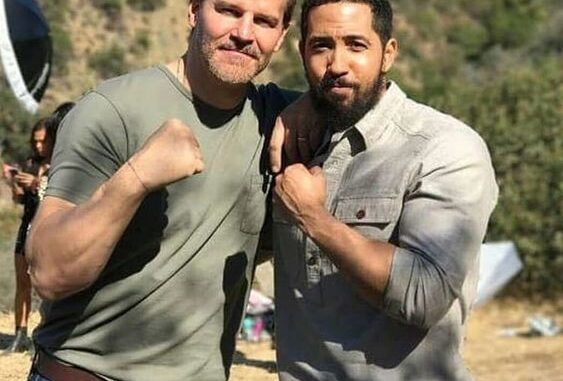
At the end of the SEAL Team series finale, Bravo moved on without two key members—but perhaps surprisingly, not because they were both dead.
Jason (David Boreanaz) is still on active duty—he’s recovering from visiting the wife of the first man he killed in Afghanistan—Omar (Raffi Barsoumian), Drew (Beau Knapp), Brock (Justin Melnick), and Trent (Tyler Gray). Meanwhile, Ray (Neil Brown Jr.) doesn’t retire to join Naima (Parisa Fakhri) full-time as Spenser House, but instead takes over the head of the warrior medical division that Jason was assigned to. Sonny (A.J. Buckley) also leaves Bravo, giving up his trident to ensure the investigation into who shot Colonel Decker doesn’t prevent Davis (Toni Trucks) from getting the promotion she deserves—and now they’re together!
TV Insider spoke with executive producer Spencer Hudnut about delivering those endings, not killing anyone off, and more.
What was true about this ending?
Spencer Hudnut: I think it’s a message of hope. Really, after seven seasons of putting our characters through so much, whether it’s in their personal lives or their mental health, we just wanted to leave them in a place—I care about these characters. We’ve dragged them down so much. I wanted to get them to a place that they felt they deserved, but they were all in places where they felt like we could see what was going to happen to them next. For Jason, while he’s still in the trenches, at least he has this new context of how he sees himself, how he sees his future, with the help of Mandy [Jessica Paré] and the help of his teammates, he’s been fighting the shame that he’s been dealing with throughout the seasons; the journey to Afghanistan really puts him on the right track to redeeming his past.
And so, I feel like, the purpose after 114 episodes to end in a way that’s not—it’s not necessarily uplifting. I think Jason still being active is a tragic element, but I think our military community, the people who watch this show, are so important to us that we have to provide a glimmer of hope and remind people that the rest of us, that we need to do more for our men and women in uniform and our veterans… It feels like an opportunity to really honor these characters, this community in a positive way.
In a world where David is leaving but the show is still going, that would be difficult, and I think there would be a temptation to maybe get rid of his character in some other way. David and I have always had the same thought that this character means so much to so many people, that for him to come to a tragic end, what would that mean? And so while I can justify that with Clay [Max Thieriot, who left for Fire Country], I think for Jason, it’s a completely different thing. So no. I would say if you asked me Season 4, the answer would probably be, yeah, Jason could have a rough ending, but especially after Clay in Season 6, I felt like we’d been through too much.
Is that also why you didn’t kill anyone else before the series finale?
Yeah. Obviously Nate [Daniel Gillies] died in the first episode, Adam [Michael Irby] died in Season 2, Full Metal [Scott Foxx] died, and then Clay. I think Clay’s death allowed us to really dig in and see what that was like for his teammates and how painful that was, and I think we said something with his death. Just killing someone else to make it tragic or to remind people of what war is, what can happen in war… We’ve spent so much time dealing with the aftermath of war that I couldn’t find a good reason to do that with any of our characters. I really love them all and want to see them go somewhere.
And I think it’s more surprising [where they end up]. I think Sonny deciding to leave the Navy is a much bigger statement than Sonny being killed on the battlefield. I think Ray deciding to stay and continue to watch over his comrades but in a new way is more interesting than seeing him die. And I think for Jason, the combination of seeing hope for the future but also not being able to give up the operation or give up this job is both a heroic and a tragic ending for him.
There are two things we don’t see: Jason’s conversation with the wife of the first person he kills, and the Bravo rescue with the wedding cutaway. Can you talk about the decision to handle those scenes like that?
Just for timeline purposes, we’re starting to break down
